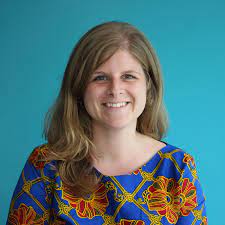Home » Perspective: Building Liberia’s Blood System is a Journey of Collaboration and Advocacy

Samantha Durdock
Senior Program Officer, Results for Development
It is a little after 10:00 pm on a Thursday in January 2024. I am entering hour three of a late-night WhatsApp call with my colleague Minnie Sirtor Bowier (based in Liberia) and Dr. Onyekachi Subah, Director of Liberia’s National Blood Safety Program. Is it late? Yes. Are we tired? Yes. But I am nearly crying with laughter.
Since R4D launched its Safe Blood Activity under USAID’s Health Systems Strengthening Accelerator in January 2022, I have become accustomed to these impromptu thought-partnering discussions with my Liberian colleagues. In this instance, we were prepping for Dr. Subah’s presentation to the World Bank the next day. We were advocating for funding from the Global Financing Facility’s Institutional Foundations to Improve Services for Health Project for Liberia (IFISH) to be dedicated to the National Blood Safety Program (NBSP) in the upcoming fiscal year.
When I first met Dr. Subah and her team, Liberia’s national blood system had only collected 100 units of blood in the entire year. This is far below the WHO recommended target of 52k-100k units of safe blood in Liberia – less than 1% of the target! While this severe gap was attributed to system-wide problems in Liberia’s blood system, Dr. Subah identified their severe funding shortages as a primary foundational challenge. In 2022, they had an annual operating budget of only $50k. That is insufficient to purchase a vehicle to carry out blood drive campaigns.
We determined with Dr. Subah that mobilizing funding for NBSP would require us to take a “building” approach. First, we needed to work with NBSP and the Ministry of Health (MOH) to establish a national policy and strategic plan for NBSP. One of their biggest roadblocks in advocating for funding (both domestically and with donors) was that there was no policy or strategy to ground funding requests. We brought in an expert in building national blood transfusion services, Thobekile Ndlovu, who also previously worked with NBSP in its earlier years when it received partner support following the Ebola outbreak in Liberia. Together, the team drafted, advocated, and eventually got MOH Senior Management approval for Liberia’s first National Blood Policy and Strategic Plan in August 2023.
In parallel to finalizing the policy and strategy, we started opportunistically submitting proposals and following up on potential funding leads. A safe blood system is cross-cutting. If we were to secure funding for NBSP, we needed to tap into the funding already going towards siloed programs. Safe blood is needed for traffic accidents, HIV and malaria patients, children with anemia, and – currently in Liberia – most often for mothers hemorrhaging during or after labor. The World Bank’s Global Financing Facility was top of the list regarding resource mobilization. In a country with a maternal mortality rate of 652 maternal deaths per 100,000 live births (one of the ten highest in the world), post-partum hemorrhage was a leading cause of death. There was a direct link between Liberia achieving its goal to reduce maternal mortality and the request for dedicated funds to improve its safe blood system. We engaged with IFISH in the summer of 2023 by co-writing a funding proposal for the NBSP. In December 2023, after months of follow-ups, we got the good news. We were in!
Our successful proposal led to a series of quickly moving pieces. Dr. Subah and NBSP knew “what” they needed funding for – and it was a lot – but they needed a sounding board to determine the best way to package and present the funding request. Through a series of conversations and thought partnering with NBSP, we worked together to take what they knew they needed and package it into a program a donor could get behind. We worked closely with Dr. Subah to create a budget and narrative aligned with NBSP’s top priorities to address foundational challenges within Liberia’s blood system. We continued supporting Dr. Subah through the process as NBSP and the IFISH team went back and forth on budget and program details, helping Dr. Subah decide where to make concessions and how to articulate the reasoning behind the importance of certain elements of the proposal. That late-night WhatsApp call in January was the culmination of this effort. It was our last run-through before the final meeting with the IFISH team.
So, where are things now? NBSP is set to have an annual operating budget in 2024 of over $500k – a far cry from the $50k they had in 2022. This is primarily funded through resources mobilized with the USAID Mission and the World Bank’s IFISH project. And we have more opportunities in the pipeline. Even through IFISH, the program is set to receive more funding this year if it demonstrates effective utilization of the first disbursement of funds. Now, R4D’s partnership with NBSP is focused on how to support them in coordinating their existing funds and building out a continued pipeline of resources for the future.
If I could stress one thing from this experience working with Dr. Subah and the NBSP team over the last couple years, it is the importance of truly thought partnering with country counterparts. How can we work together to solve problems within the context in which they operate? This feels more common sense than rocket science, but it is at the core of R4D’s approach toward building systems-level change.




